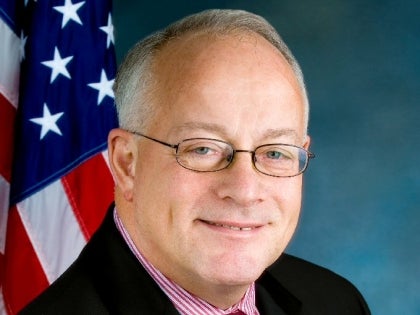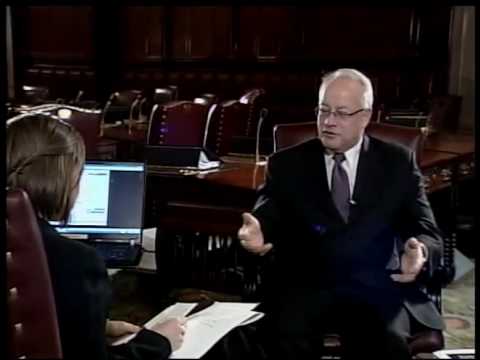
Senator Volker Announces Senate Passage Of Tough Criminal Penalties For Methamphetamine
(Albany, NY) Senator Dale M. Volker (R-I-C, Depew) today announced that the New York State Senate passed a package of legislation that would crack down on the production of dangerously addictive methamphetamines by establishing tough criminal penalties for possessing the materials used to make "meth" and operating the laboratories used to manufacture the drug.
"What we are seeing in New York State is an explosion of methamphetamine addicts ruining their lives, their families, and their communities," said Senator Dale M. Volker. "Methamphetime labs have become more prevalent during the past five years and are often times being located in rural western New York and upstate regions due to the clandestine nature of the manufacturing process. We must act now to thwart this new epidemic, which is beginning to surpass the crack epidemic of the 1990’s, that destroyed the families and livelihoods of thousands of New Yorkers."
One bill (S.1844), would make it easier to prosecute manufacturers of the illegal drug, commonly known as "meth," and would create a new class of felony crime for operating a meth drug lab in a residential neighborhood. The bill would also create a new felony crime for the criminal manufacture of methamphetamine in or near a residence. Strict penalties would be imposed for setting up or operating illegal meth labs within 500 feet of a dwelling. Since meth manufacturing includes the use of highly explosive, flammable and toxic chemicals, meth labs pose a significant public health and safety threat if located in residential neighborhoods.
Federal law imposes tough criminal penalties on people who, with the intent to manufacture meth, possess just one of a number of listed ingredients. New York's current controlled substances "precursor law" punishes only those who possess a combination of chemicals with the intent to illegally manufacture a drug. This bill would adopt the federal standard that only one of a designated list of ingredients must be found in the possession of a person, who a jury concludes intends to manufacture meth, in order to support a felony conviction of criminal possession of precursors of controlled substances.
Earlier this year, the Senate passed a bill (S.1712), that would create a new felony crime for "operating a controlled substance establishment." Property owners would be held criminally responsible for "knowingly and intentionally" allowing people to manufacturer meth, or any other illegal drug sellers to operate on the premises they own.
Additionally, Legislation (S.3511), a Governor’s Program Bill, would impose significant criminal penalties upon persons who operate or assist in the operation of clandestine methamphetamine laboratories and would increase penalties for the theft of, or possession of, stolen anhydrous ammonia, which is used to manufacture meth.
-MORE-
Anhydrous ammonia is most commonly used as an agricultural fertilizer and industrial refrigerant generally stored and used at agricultural retailers and facilities. Thieves profit from the ammonia when they steal it from farmers and sell to illegal drug makers.
In addition to its use in the production of illegal drugs, the United States Federal Bureau of Investigation (FBI) is concerned with Anhydrous ammonia’s potential use as a chemical weapon. The substance is stored as liquid under pressure and becomes a toxic gas when released into the environment. The toxic cloud of gas can travel along the ground before dispersing into the air where it can have deadly effects.
The Senate passed legislation (S.484-A), making it unlawful to sell more than two containers of certain medications containing ephedrine, pseudoephedrine or phenylpropanolamine and requiring such products to be in a locked case, behind the counter or maintained in a similar fashion limiting customer access to these products.
Pseudoephedrine, ephedrine and phenylpropanolamine, used properly, are decongestants which relieve nasal discomfort caused by colds, allergies and hay fever. They relieve stuffy nose, open nasal airways, and drain sinuses. Some brand names of pseudoephedrine include Afrin, Pediacare, Sinutab, and Sudafed. However, pseudoephedrine, ephedrine or phenylpropanolamine is a main ingredient, or precursor substance, used to make the illegal substance known as crystal methamphetamine.
Criminals who operate meth labs have easy access to the precursor substances used to manufacture this illegal substance, making it necessary to restrict the sale of large quantities of pseudoephedrine, ephedrine and phenylpropanolamine.
The states of Arizona, Arkansas, California, Georgia, Illinois, Missouri, North Dakota, Oklahoma and Washington all have some form of restricted purchasing access of products containing pseudoephedrine, ephedrine and/or phenylpropanolamine on their books.
Pediatric products labeled as such by federal regulation are exempt due to the fact that they are formulated specifically for use by those under 12 years of age. Therefore, they contain much less pseudoephedrine than an adult-strength product. In addition, these products are typically in a dosage form that makes it very difficult to illicitly extract the pseudoephedrine, such as liquids and chewable tablets for easy dosing to children. Other products that are formulated in a way that the pseudoephedrine, ephedrine or phenylpropanolamine cannot be extracted are also exempt, including liquids, liquid capsules or gel capsules that include other ingredients.


